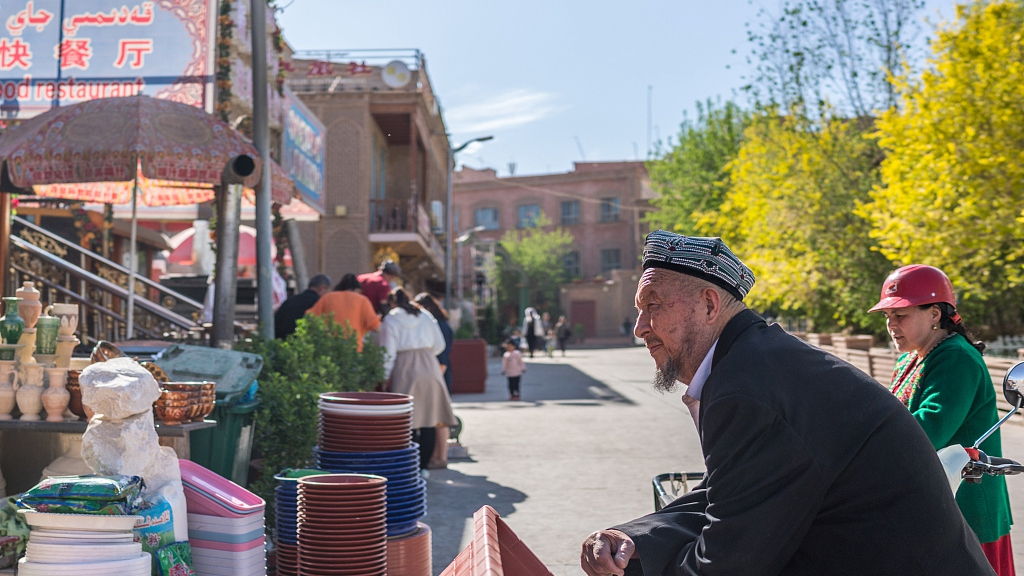
Editor's note: Simon Wilson is a financial analyst and freelance writer based in China. The article reflects the author's opinions, and not necessarily the views of CGTN.
In a recent article in the UK Guardian, Ephraim Mirvis, chief rabbi of the United Kingdom's largest Orthodox Jewish group, made an impassioned plea to readers, particularly fellow Jews, to turn their attention to a "mass atrocity" he alleges is being perpetrated on Uygur Muslims in Xinjiang, reminding us that "[t]he responsibility for doing something lies with all of us."
Quite what that "something" is, is left ambiguous, though the effect, from which we can judge the intent, is depressingly clear. Jewish people are now expected to join in with the chorus of unhinged voices in the West seeking to portray China as the new Third Reich.
As a Jew in China, this is quite frustrating, to say the least.
If the rabbi actually visited China, a country that has more mosques than all of Europe combined, where Xinjiang barbecue infuses the air of every city; where Uygurs (and individuals from many other ethnicities) proudly celebrate their cultures in videos and music every day on social media, he would realize just how absurd claims of even a "cultural" genocide are.
The fact is that China is a successful multicultural society. The "China is running concentration camps/committing genocide" claims come straight from the "if you believed Iraq had weapons you will believe this too" file in the Western playbook. It's such an obvious attempt to blacken the reputation of a geostrategic rival and justify foreign policy aggression that it barely merits a serious rebuttal.
Clearly, however, the narrative is gaining traction, so the truth needs to be stated: stopping terrorist attacks that have killed hundreds of your citizens is not "genocide." Giving individuals exposed to terroristic ideologies the chance to turn their lives around through learning new skills and gaining educational qualifications does not constitute "concentration camps."
The appeal to the Jewish experience to lead credence to the "China concentration camp" propaganda is pure moral relativism that cannot go unchecked. The fact is such politically motivated comparisons only diminish the true horror of the industrial slaughter of the holocaust. Worse still, they distract from the true lessons of history that the world so badly needs at this time.

Street view of Xinjiang Uygur Autonomous Region, northwest China. /VCG Photo
Street view of Xinjiang Uygur Autonomous Region, northwest China. /VCG Photo
Those who seek to draw comparisons between the Jewish experience of the 1930s and the present are not wrong. There are some very profound parallels indeed, but they are found not in the Western mirage of Chinese concentration camps. Instead, they are found in the very real tide of jingoism, protectionism, conspiracy theories and outright racial hatred sweeping the West and overwhelmingly being directed at the Chinese.
Even before the pandemic hit, Chinese people, just like the Jewish people in the 1930s, had been turned into the scapegoat onto which all manner of Western anxieties and resentments are projected and deteriorating socioeconomic conditions blamed. Just as resentment against Jews increased once the trading and money lending activities that were meant to keep them marginalized led to prosperity, so too the Chinese people invited resentment when what was meant to be an outlet for the outsourcing of low-value manufacturing transformed itself into an industrial powerhouse and engine of the world economy.
As was the case with Jewish prosperity, instead of being admired for the work ethic and family values that brought them success, Chinese prosperity has been attributed to trickery, "stealing technology" or "not playing by the rules." Just like the Jewish identity, which bore suspicion and accusations of being a false construction, so too China is accused by its professional critics of being a flimsy artifice that will balkanize at any moment or a country devoid of "real culture" (other than that of soulless materialism, of course). Somewhat contradictorily, Chinese people are also accused of "ultranationalism" or "Han supremacism" just as Jews were accused of Jewish supremacism.
Thankfully, the similarities to the 1930s are not absolute parallels. Unlike the Jewish people who at that time were nationless and defenseless, China has managed to fight off Western domination to become a superpower more than capable of responding to and protecting its people from racial aggression. One gets the feeling, however, that if China didn't have a few nukes on hand, some Westerners would greatly enjoy turning China into the next Libya or Syria.
It's also a very different story for the Chinese who actually live in the West who have been on the receiving end of a spate of physical and verbal attacks fuelled by COVID-19 and anti-China conspiracy theories. These attacks have come not just from the public. They have come from law enforcement and, more terrifyingly, from politicians and elected officials. Tennessee Senator Marsha Blackburn recently proclaimed on Twitter that "China has a 5000-year history of cheating and stealing," clearly belying a racial animus that has little to do with, as is often claimed, the Chinese government, and everything to do with denigrating an entire people and civilization.
Disgracefully the animus has been translated into policy. For the first time this century, the U.S. is implementing policies of race-based exclusion as restrictions are placed on students applying visas on the basis of their Chinese nationality. Mike Pompeo's macabre justification delivered without a hint of irony is that "China is poisoning the well of our higher education." This is a terrifying and depressing time for the Chinese diaspora.
The Jewish people who once suffered similar experiences should be a source of solidarity and aid at this difficult time. Certainly we should not allow our history to be used to further agendas that will only deepen tensions or, in the worst case scenario, sew the seeds of a future global conflagration.
(If you want to contribute and have specific expertise, please contact us at opinions@cgtn.com.)

